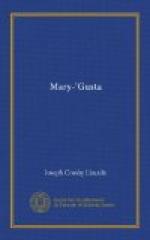Alone in her own room once more she sat down to think. It was plain enough now. All the parts of the puzzle fitted together. Edwin Smith having been proved to be Edgar Farmer, everything was explainable. It had seemed queer to her, Mr. Smith’s aversion to the East, his refusal to come East even to his son’s graduation; but it was not at all queer that Edgar Farmer, the embezzler, should feel such an aversion, or refuse to visit a locality where, even after all these years, he might be recognized. It was not odd that he disliked to be photographed. And it certainly was not strange that he should have behaved as he did when his son announced the intention of marrying her, Mary Lathrop, stepdaughter of one of his former partners and victims’ and adopted niece and ward of the other two.
What a terrible surprise and shock Crawford’s communication must have been to him! The dead past, the past he no doubt had believed buried forever, had risen from the tomb to confront him. His only son, the boy he idolized, who believed him to be a man of honor, whose love and respect meant more than the world to him—his only son asking to marry the ward of the man whom he had wronged beyond mortal forgiveness, asking to marry her and intimating that he would marry her whether or no. And the secret which he had guarded so jealously, had hidden from his son and the world with such infinite pains, suddenly threatening to be cried aloud in the streets for all, his boy included, to hear. Mary shuddered as she realized what the man must have felt. It must have seemed to him like the direct hand of avenging Providence. No wonder he at first could not believe it to be merely accident, coincidence; no wonder that he asked if Zoeth Hamilton had sent Crawford to him, and had demanded to know what Zoeth Hamilton had told.
It was dreadful, it was pitiful. She found herself pitying Edwin Smith—or Edgar Farmer—even though she knew the retribution which had come upon him was deserved.
She pitied him—yes; but now she could spare little pity for others, she needed as much herself. For minute by minute, as she sat there thinking out this great problem just as the little Mary-’Gusta used to think out her small ones, her duty became clear and more clear to her mind. Edgar Farmer’s secret must be kept. For Crawford’s sake it must be. He need not—he must not—learn that the father he had honored and respected all his life was unworthy of that honor and respect. And her uncles—they must not know. The old skeleton must not be dug from its grave. Her Uncle Zoeth had told her only a little while before that he was learning to forget, or if not to forget at least to be more reconciled. She did not understand him then; now she did. To have him learn that Edgar Farmer was alive, that his son—Oh, no, he must not learn it! Ill as he was, and weak as he was likely to be always, the shock might kill him. And yet sooner or later he would learn unless the secret remained, as it had been for years, undisclosed.




